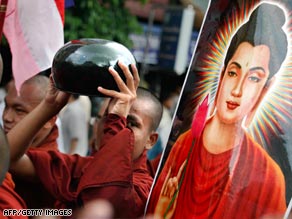The Overturned Almsbowls
by Visakha Kawasaki, Kandy, Sri Lanka, The Buddhist Channel, Sept 26, 2007
Thank you for your in-depth and up to the minute coverage of events in Burma. My comments on the on-going turmoil happening there.

<< Patam nikkujjana kamma - a monk's act of ex-communication (against the millitary rulers) by overturning the alms bowl
If the generals were wise, they would immediately ask for the Sangha’s forgiveness and beg to be reconciled, so the almsbowls could be turned back upright once more. Instead, alas, they seem bent on compounding their sins.
The incident that led Buddha to institute the act of overturning the bowl on malevolent laypeople involved the arahat, Ven. Dabba-Mallaputta.
As a child of seven, Dabba had asked his grandmother if he could join the Sangha; he became an arahat as his hair was being shaved. In robes, he accompanied Buddha back to Rajagaha where he volunteered, with the Buddha's permission, to arrange lodgings for traveling monks and to allot meals. He carried out those duties fairly and intelligently.
Once he allotted meals at the house of a rich man to the Mettiyabhummajaká, a group of monks who were the source of many problems and prohibitions in the Vinaya. When the wealthy donor discovered the identity of the monks, he gave orders to his servants that they were to be fed something or other.
The Mettiyabhummajaka monks were extremely offended. They suspected Dabba of intending to slight them, and tried several times to ruin him, but he was found innocent.
In one attempt, the Mettiyabhummajaka persuaded a Licchavi layman named Vaddha to lie and accuse Dabba of having an affair with his wife. Dabba repudiated the charge, and the Buddha ordered the Sangha to proclaim the pattanikkujjana on Vaddha.
When Ananda visited Vaddha and told him of his punishment, he fainted.
Not long after, he went to Buddha with his family to beg for forgiveness. He was ordered to go before the Sangha and confess his error, after which the sentence was revoked.
Let us continue our daily meditations, extending metta to all in Burma: to the noble monks who dare to stand up for the truth, to Daw Suu who has patiently endured much suffering, to the students who risk so much to let us know what is happening, to those in Burma’s wretched prisons, to the poor people who can barely survive there, to the soldiers and police who may choose not to harm their own people, to the generals who may change their minds and reconcile themselves with their teachers in the Sangha.
When we meditate at 8 PM Rangoon time, we join Burmese throughout the country and friends of Burma all around the world.


